| Listing 1 - 2 of 2 |
Sort by
|

ISBN: 0585201129 9780585201122 0817309241 9780817309244 0817353291 9780817353292 Year: 1998 Publisher: Tuscaloosa : University of Alabama Press,
Abstract | Keywords | Export | Availability | Bookmark
 Loading...
Loading...Choose an application
- Reference Manager
- EndNote
- RefWorks (Direct export to RefWorks)
Originally published in German, Erika Thurner's National Socialism and Gypsies in Austria is the ground-breaking study of Nazi policy toward Gypsies during the Third Reich. As noted in the foreword, although Jews were the major target of the Nazis, others were also marked for extermination. Indeed, of the groups targeted by the Nazis, only Jews and Gypsies were killed indiscriminately and tribally, that is, by the gassing of entire family groups of men, women, and children. Of the eleven thousand Gypsies living in Austria at the start of the war, only three thousand survived Nazi persecution. In the first English translation of this important work, Gilya Gerda Schmidt makes available Thurner's investigation of Camps Salzburg and Lackenbach, the two central areas of Gypsy persecution in Austria. This English translation has also been expanded, with a new study of Camp Salzburg, an updated bibliography, and numerous photographs, which were not included in the German edition.
Romanies --- World War, 1939-1945 --- National socialism. --- National socialism --- History - General --- History & Archaeology --- Nazism --- Authoritarianism --- Fascism --- Nazis --- Neo-Nazism --- Totalitarianism --- Bohemians (Romanies) --- Gipsies --- Gitanos --- Gypsies --- Kalderash --- Manush --- Roma (People) --- Romani --- Sinti --- Nomads --- Nazi persecution --- Concentration camps --- Atrocities. --- Atrocities --- Causes --- Romani Genocide, 1939-1945 --- Baro Porrajmos, 1939-1945 --- Genocide of the Romanies, 1939-1945 --- Nazi persecution of Romanies, 1939-1945 --- Pharrajimos, 1939-1945 --- Porajmos, 1939-1945 --- Porrajmos, 1939-1945 --- Romani Holocaust, 1939-1945 --- Romany Holocaust, 1939-1945 --- Romany Genocide, 1939-1945 --- Samudaripen, 1939-1945 --- Genocide --- Crimes against --- Nazi Holocaust, 1939-1945 (Romani Genocide)
Book
ISBN: 390318702X 3902936959 9783902936950 Year: 2018 Publisher: innsbruck university press
Abstract | Keywords | Export | Availability | Bookmark
 Loading...
Loading...Choose an application
- Reference Manager
- EndNote
- RefWorks (Direct export to RefWorks)
World literature and translation, the world and the literary field as well as migration, translingual writing and hybridity are the topics of the present contributions to Slavic literatures of the present. The book combines analyzes of texts that have been written in Slavic, but also in non-Slavic languages or in several languages at the same time. Thus, works created in Russian, Bosnian-Croatian-Serbian, Polish, Czech, German, Tatar, English and French are associated with each other. The texts refer to global literary traditions, events and ways of life. However, they also respond to different local cultural and historical developments and social structures. On the one hand, the volume offers access to concepts of world literature and enriches the current debate on case studies from the Eastern European and Slavic contexts. On the other hand, he extends the Slavic discussion by dealing with theories and methods of world literature and the possibilities of their application to Slavic texts.
| Listing 1 - 2 of 2 |
Sort by
|

 Search
Search Feedback
Feedback About UniCat
About UniCat  Help
Help News
News